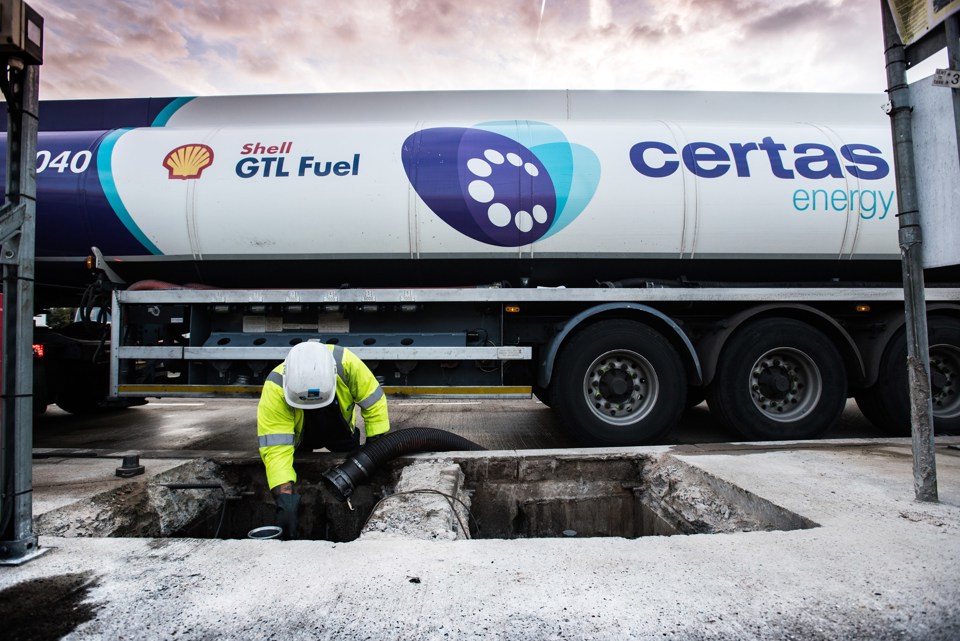Shell has started distributing a new diesel alternative called GTL (gas-to-liquid) to HGV fleets which it claims will reduce NOx emissions by up to 37% on Euro 5 diesel engines. GTL can be used with existing vehicles without the need for engine modifications, engine flushes or cleans, new infrastructure or vehicle investment.
The company estimates there is already sufficient global supply of GTL to meet 30% of the UK’s entire national diesel demand.
Its own figures show that Euro 5 vehicles, including buses, city utility vehicles and transport trucks, would see reductions in NOx emissions of between 5-37% and a reduction in particulate matter of between 10-38%. The savings are lower for Euro 3 and Euro 4 vehicles.
Shell doesn’t currently have figures on light commercial vehicles, but claims they will also see improvements.
The fuel giant has appointed Certas as its official distributor in the UK and it has started working with companies in the North West and South East of England so far.
Brian Worrall, director of corporate affairs at Certas Energy, said the introduction of the new London T-Charge and the onset of Low Emissions Zones in the UK has put added pressure on haulage companies to make sure their fleets are taking action to reduce emissions.
He said: “GTL distribution is still in its early stages but we have seen fleets with HGVs looking for immediate ways they can address emissions.”
Slight costs increase
GTL does cost slightly more than diesel with a difference of “a few pence extra per litre”. However, pricing depends on the quantity of fuel ordered. Higher volumes can be supplied at a lower price and the price will also reduce as more customers switch to GTL across the UK.
Brakes, a UK food wholesaler, has switched its fleet of 42 DAF LF55.220 18T trucks operating in London from diesel to Shell GTL. Certas has already delivered 70,000 litres of GTL to Brakes.
Steve Webster, head of indirect goods and services procurement at Brakes, said: “With have more than 2,000 trucks on the road each day in the UK so we’re always looking at ways to reduce emissions and operate more sustainably.
“Our drivers have commented that there has been no adverse effect on engine performance by switching fuel and we’ve had a lot of feedback that the engines seem to be quieter, particularly when idle.
“This is a major advantage as many of our routes see us travel through residential areas.”
Webster said Brakes made the switch to GTL with no issues from an operations perspective.
Brakes has branded all of its DAF trucks operating in the London area with the Shell GTL Fuel, Certas Energy and DAF logos with the tag line ‘delivering on a cleaner-burning diesel for London’ to raise awareness of its commitment to lowering emissions.
Following the successful use of GTL in the DAF trucks, Brakes has also started using the fuel in 36 of its Mercedes-Benz trucks.
GTL works by making hydrocarbon products from natural gas. This process breaks down gas molecules and reassembles them into larger, uniform molecules.
Shell’s ambition is to establish GTL as part of the future fuel mix alongside electric cars, LNG, hydrogen, CNG, LPG, diesel and petrol.
Certas has 140 depots across the UK but is primarily serving GTL to customers in the North West and South East.
Worrall said: “It’s a chicken and egg situation at the moment as we can technically serve any customer in the UK but there has to be the demand. If a company was to put an order in for the fuel we could have it with them in a matter of days.”
EN fuel standard
Worrall said that, while paraffinic fuels have been around for a while, GTL achieved the EN fuel standard last year and this has led to a boost in confidence in trialling it.
He said: “The EN fuel standard for GTL has given people a lot more confidence, particularly around things where engine warranties dictate an EN-rated fuel to be used.”
While it’s difficult to predict how technology like electrification will change the HGV sector, Worrall believes that GTL could act as an immediate alternative to diesel.
He concluded: “An immediate switch away from diesel to GTL by a large part of the HGV industry is certainly possible.”





















Login to comment
Comments
No comments have been made yet.